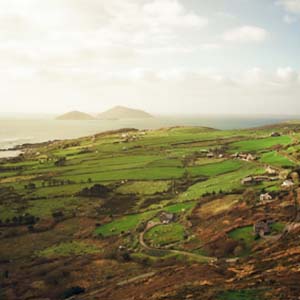Moving to Ireland
Ireland offers breath-taking landscapes, exciting opportunities, and welcoming atmospheres. Modern developments to the country’s economy and infrastructure mean that Ireland nationals are no longer all moving abroad to find new opportunities. Tradition is weaved into every fibre of Ireland, including the population of around 4 million people.
While some things are kept the same to preserve tradition, many things have changed in Ireland’s recent history. The country’s relationship to the Roman Catholic Church as well as their English neighbours has changed considerably, but it’s important to remember the past. As a population, the Irish enjoy talking, singing, and telling stories and are warm and welcoming to the many expatriates who have already made the move to Ireland.
Orientation in Ireland
Learning the language shouldn’t be a problem for UK nationals moving to Ireland. While English is spoken by almost the entire population, it’s important to remember that Irish is the first official language of Ireland. Learning Irish is now being encouraged more through national curriculums and although it is not necessary to learn to be able to live and work in Ireland, learning key phrases and place names will be welcomed among locals.

What is the Cost of Moving to Ireland?
If you are thinking about the cost of moving to Ireland, make sure you include the €60 single entry visa or the €100 entry fee for multi people. You will also need to factor in the cost of moving your belongings and check if you are likely to incur any import fees. The cost of living in Ireland is surprisingly quite high and considered the 3rd highest in Western Europe.
Getting Ready to Move to Ireland
If you’re moving to Ireland from the UK for your current working role, your employer may provide assistance with ensuring you have all the correct documents for your relocation, either in-house or through an external vendor. You should make the most of any help you receive to make the process as smooth as possible.
Passports: Every person travelling from the UK should have a valid passport on their person which is valid for longer than your intended stay abroad. You should always check that passports are valid and check for any additional requirements.
Visas and Permits: Visas are often required for a country’s government to authorise your entry from the UK. It could be stamped in your passport, on a separate paper or in an electronic form. You may need additional authorization papers to import household belongings, cars, and other items, so you should check all the requirements before you travel.
Requirements for Britain travelling abroad have changed due to Brexit regulations. For more information on Visas for Ireland, visit the Department of Justice website and the Department of Foreign Affairs for Ireland.
Gerson Relocation Consultants are here to help you with every step in the relocation process. For help with a visa application or immigration advice, view our Immigration Services.

Transporting Household Goods to Ireland
As Britons moving to Ireland are now moving from a non-EU country, you will now have to comply with customs regulations. Personal property is generally permitted to be imported into Ireland without any charges if these requirements are met and documentation can be provided:
- Items are imported 6 months before or within 12 months of the resident’s arrival in Ireland.
- Items have been owned and used by individuals for at least 6 months prior to the move.
- Owner’s normal place of residence was outside the EU for at least 12 continuous months.
- Items may not be sold, lent, or hired for 12 months after importation.
- Items must be accompanied by a ‘Transfer of Residence’ form.
- Items must be accompanied by an ‘Application and Declaration for Exemption from Import Charges and Vehicle Registration Tax’.
If looking for assistance in your International Removal, Gerson Relocation can help. Request a free quote for your move today.
Restricted and Prohibited Items
Certain items entering Ireland have restrictions placed on them. If travellers from outside the EU are carrying over €10,000 in cash when entering Ireland, they must declare it at customs. Any prescription medication must be accompanied by a copy of a prescription letter and a letter from the prescribing doctor confirming its necessity for the patient.
The following items are prohibited from entering Ireland:
- Meat, poultry, dairy products, plants and plant products.
- Narcotics.
- Firearms, Ammunition, or other weapons without a license from the Department of Justice.
- Pornographic material or media.
Taking my Pet when Moving to Ireland
The very strict animal entry laws in Ireland are now in line with those in place in other EU countries. Pets from within the EU or other qualifying areas, listed on the Citizens Information website, may arrive at any Ireland airport or port. Pets from other countries must enter through Dublin Airport.
Certain requirements must be met to be able to import dogs, cats, and ferrets moving to Ireland. These include:
- ISO 11785 compatible microchip, inserted prior to rabies vaccination and verified on pet passport.
- Rabies vaccination administered 21 days or more before travel.
- Blood test for rabies if a pet arrives from a high-risk country.
- Tapeworm treatment for dogs (not for cats).
- Travel within five days of the owner’s arrival.
Furthermore, a maximum of 5 pets per traveller may be imported to Ireland and animals must be at least 12 weeks old before their rabies vaccination. For pets travelling from higher risk countries, other restrictions and requirements will apply.
For those importing other types of pets, such as birds, rodents, and rabbits, an ‘Advance Notice of Import’ must be submitted to the Animal Health and Welfare Division with at least 24 hours advance. For more information on importing animals to Ireland, visit the Department of Agriculture, Food and the Marine website.

Taking a Vehicle
When deciding to take your vehicle if you’re moving to Ireland, you should check that your employer has not placed any size or weight restrictions on your household shipment as this could affect your decision.
If certain conditions are met, non-EU foreign nationals may import vehicles free of usual charges, such as value-added tax, duty fees, and vehicle registration tax. When the vehicle arrives in Ireland, you must make an application for exemption immediately to avoid these charges. Information on applying for exemption can be found on the Irish Tax and Customs website.
If you are not eligible for exemption, a Vehicle Registration Tax must be paid. The Irish Tax and Customs has a VRT Calculator to estimate the charge for your specific vehicle. There is also an annual motor tax which is calculated according to your vehicle’s engine size. The front windshield should have a disc displaying your current insurance and this will be randomly checked with heavy fines for invalid or missing insurance discs. Drivers may pay the tax online.
Banking Services in Ireland
Banks in Ireland provide a competitive range of services for all needs. Online, telephone, and mobile banking services are available in most places and credit, debit, and ATM cards can be requested. People may also apply for loans, investments, and insurance through banks in Ireland. Banks will typically be open from 10 am – 4 pm on weekdays and closed on weekends.
It is permitted for foreigners to open bank accounts in Ireland if they can supply the correct documentation. To open most accounts, you will need to provide at least a form of identification and proof of address. Current accounts, savings, or deposit accounts (lodgements) are all available services.

Currency and Exchange
The official currency of Ireland is the Euro (€). Euro notes are produced in denominations of €5, 10, 20, 50, 100, and 200, while coins come in €1, €2 and 5, 10, 20, and 50 cents. Euro coins commissioned in Ireland have the European design on one side and the Irish national motif on the other coin face. Despite this, all Euro currency may be used throughout European countries.
Bank branches, ATMs, hotels, and airports will also offer exchange services. The highest fees will be charged by hotels and desks in airports, which also provide less favourable exchange rates. The Wise Rate Tracker will show recent exchange rates for the British Pound to Euro.
Finding a home in Ireland
Expats moving to Ireland usually rent accommodation rather than buy. This is a good option initially, whether you intend to buy or rent long term, as it will allow you to check out the neighbourhoods near you and where you would like to live on a longer-term basis.
Buying Property: It is possible for expatriates living in Ireland for longer periods to buy housing, however, housing to buy is generally more difficult to find and expensive. If the home is on 5 acres of land or less, foreigners are permitted to acquire the property. Some restrictions apply for properties in a larger area than this. Many financial institutions make it possible to obtain a mortgage, so comparing prices is recommended. Private sales or auctions are both options for purchasing property, but a solicitor or lawyer is essential for advising, negotiating, and finalising transactions.
Renting Property: Despite it being more expensive over long periods, it is far less complicated to rent accommodation in Ireland. Shorter-term property is in high demand meaning that prices will continue to increase.
When signing a rental lease, a refundable security deposit equating to 1 months’ rent will be expected. Rent is typically paid monthly in advance. You should read your lease carefully to understand what your rights and the landlords’ rights are. If you are unsure how long your stay will be, try to obtain an escape clause in your lease to allow you to leave with a 30-day notice period. Pets are generally not allowed in rental properties.

Best places to live in Ireland
The best place to live in Ireland for you will depend on a variety of personal factors: Proximity to schools, office, transport, and other facilities. Throughout Ireland’s cities, expatriates find suitable and comfortable places to live.
Cork: Cork is an easily accessible city, with excellent infrastructure and reliable public transportation services. Residential areas surround the city centre but, due to a new urban renewal scheme, there are more apartments in the city centre. Some surrounding areas to Cork offer more countryside living options.
Dublin: Ireland’s capital city offers a popular and desirable lifestyle for Ireland nationals and expatriates. It is a manageable size but offers all the benefits of a large city. Rich cultural life is complemented by good shopping facilities, open green spaces, and a range of houses and apartments are available. There are also many estates within 20- to 30-minutes by car from the city centre.
Galway and vicinity: Most areas in and around Galway offer a range of property types in a range of locations. Old warehouses and abandoned buildings are now being developed into apartments and small townhouses. With residences in semi-rural areas, public transport connections are less frequent.
Limerick and vicinity: There are many urban areas surrounding Limerick with connections by public bus transportation, though expats will find a car necessary living in Ireland in this area. Good schools are available in many areas, as well as a range of facilities for a comfortable life.
Short Term Housing in Ireland
Most cities and towns throughout Ireland offer various options for short-term accommodation, from hostels to bed and breakfasts. As part of the relocation process, some companies rent short-term housing for their employees, so you should ask about this before finding arrangements.
In Cork, there are holiday villages which provide well serviced apartments for short-term lease. For finding temporary accommodation in Dublin, you should ask co-workers and friends, as well as frequenting local newspapers, tourist offices, or other listing companies. For short-term accommodation in Limerick, there are short-term leases available in hotels, apartments, townhouses and more in several areas of the city.
Gerson Relocation offers Serviced Accommodation as part of our Relocation Services. For help with your accommodation search, get in touch with us today.
Getting Around in Ireland
When moving to Ireland’s major cities, good public transportation links will allow you to travel where is needed. However, in more suburban or rural areas you may need to use a private vehicle. Expatriates living in Ireland tend to take their own vehicles or buy a car locally. Narrow rural roads and high petrol prices favour using smaller vehicles.
Driving Conditions in Ireland
Expatriates moving to Ireland from the UK will not struggle with driving in Ireland as they also drive on the left side of the road. The major roads in Ireland are in good condition, however, smaller roads can be narrow and left in poor repair. As in the UK, drivers should look out for potholes and rough conditions. Cattle and sheep are both hazards to roads in Ireland so be careful in rural areas, particularly at night.
Driver’s License
When driving a car in Ireland, it is required that drivers always carry a driver’s license. You may drive for up to 12 months on your home license and International Driving Permit. If you intend to remain in Ireland for longer than 12 months, it is necessary to acquire an Irish driving license. If you have a driver’s license issued in the UK, you may exchange your license for an Irish license without taking a driving examination. For more information on exchanging your license, check the NDLS website.
Vehicle Insurance
Driving in Ireland requires you to obtain vehicle insurance. The minimum required is third-party coverage, but most drivers carry more than this. Insurance covers the driver rather than the vehicle, therefore drivers in Ireland should have their own policy or be named on someone else’s. Vehicle insurance is quite expensive in Ireland and will depend on similar factors to UK Vehicle Insurance.
Public Transportation Services in Ireland
Throughout Ireland, public transportation is generally efficient, reasonably priced, and safe. Mass transit does not serve towns and villages as well as major cities, similar to British public transport. City dwellers will find public transport more convenient than owning a private vehicle.
Buses: Travel by bus in Ireland is reliable, comfortable, and more affordable than rail options. Bus Éireann, or Irish Bus, provides travel between all major cities. Expressway buses cover major routes and can connect to more local routes at interchange points. To stop a local bus, you must “flag” or wave to signal it to stop. Fares are often paid by exact change to the driver or by Leap Cards, which can be prepaid, or smartphone e-tickets.
Rail: Clean, modern trains run between major cities operated by Iarnród Éireann. Service between Dublin and large towns is good but is less frequent between smaller towns.
Air Travel: Domestic air service is also available at affordable prices, and flights to other European cities are also available. 4 international airports service the Irish population: Cork, Dublin, Knock, and Shannon.

Expatriate Community in Ireland
Across the country’s cities, there are many expatriates living and working in Ireland. Most locations have an established expatriate community with many opportunities to be involved in social activities. The friendliness of the population makes for an easy relocation for expatriates.
There are a wealth of welcome networks and orientation programmes to help newer arrivals. Schools are a natural focus for social interaction, as are religious and sporting activities. The Irish are big fans of outdoor activities and sports, so many are members of some sports club or organisation. Local sports and activity clubs welcome expatriate members, so you can find people with similar interests and hobbies. Volunteering organisations exist too, normally attached to museums.
Understanding the Irish
It is normally not difficult to become friends with Irish people. One of the best ways to enjoy the company of friends is an evening in an Irish pub. The Irish are very hospitable people, but it’s not usual to receive invitations to people’s homes. Pubs or other public places will provide a venue for friendly visits or conversations. Gifts are not customary, however, if invited to someone’s home you should consider bringing a small gift with you for your hosts.
It is a good idea to be knowledgeable of Ireland’s difficult past with England and English people, as ignorant comments could cause offence to Irish people.

Religious Worship
Most people living in Ireland are Roman Catholic and there are churches throughout the country. Protestants make up a smaller minority and are present in most major towns, with other smaller Jewish, Islamic, and Buddhist communities around the country.
Greetings and Names
When introducing or being introduced in Ireland, a handshake is a common form of greeting. Common courtesy encourages women to offer her hand first and many men stand when greeting women. Maintaining eye contact is a good way of establishing a connection among the Irish.
When first meeting someone in a formal situation, formal titles are typically used, however the Irish are informal about forms of address. After a short time if not immediately, you will likely be invited to use their first names. Greetings of “Hello!” and “How are you?” are commonly exchanged. In Irish, popular greetings are “Dia Dhuit” meaning ‘hello’ and “Slan” meaning ‘bye’.
Alcohol and Drinking in Ireland
Irish pubs remain the most popular form of nightlife in Ireland, though nightclubs and music clubs do exist. Pubs are a place for drinking, eating, and talking, which are collectively known as ‘craic’. It is not considered insulting to refuse an alcoholic beverage in a pub, nor is it expected that you buy a round of drinks for the group. Buying a round with a group that buys rounds is customary and is known as a ‘shout’. Toasts, the most popular being ‘slainte’, are also common.
Beer is the nation’s favourite alcoholic drink, but a wide variety of types of alcohol are available to choose from. Irish beers tend to be higher in alcohol content than other international beers.
Etiquette
Irish people are polite and tend to have a low-key manner. They are normally witty and enjoy telling stories but are still modest and friendly people. Good-natured teasing and banter are part of friendships and should not be taken seriously. When dining, it is good manners to keep hands in their laps when not eating. It’s also normal that each member of a group of friends takes a turn paying for a round of drinks.
Tipping in Ireland
If a service charge is not included in the bill in a restaurant or pub, waiters generally receive 10-15% as a tip. Hairdressers and barbers are also given a tip, as well as taxi drivers in Ireland.
Interested in information on another country? Take a look at our other International Relocation guides.
Great customer Experiences start here
Very pleasent and helpful. Nothing too much trouble.
Mr M H moved from London, UK to Toronto, Canada
Very helpful and patient even when things got packed that we had to get out again!
Mr M E moved from Enfield, UK to Dorset, UK
Thanks to Graham, Nick and the entire crew!
Mr C D M moved from UK to Singapore
Friendly and helpful crew.
Ms T W moved from USA to Cambridgeshire, UK
